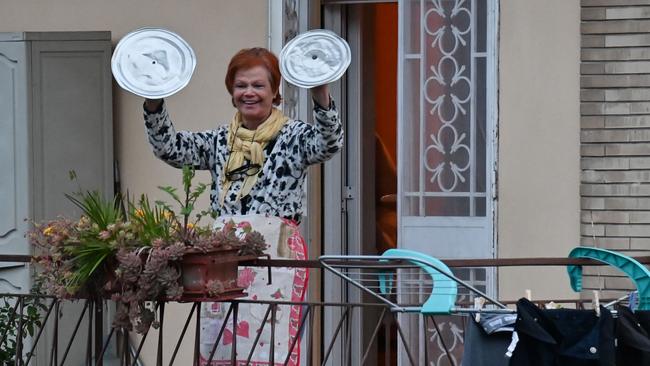Coronavirus: Spirited Italians will not succumb
The Italians are paying a high price for not having enough children.

Italy was the first country in the world to have, in raw numbers, more people over 65 than under 18. In older societies there are more people suffering from pre-existing health problems susceptible to severe symptoms. Also, in Italy, the number of infections climbed rapidly early on, more quickly than in Germany or France. Italy’s culture, food, scenery, and the truly warm people, are a magnet for the world including recently huge numbers of Chinese. Two of the three first cases in Italy were Chinese.
I have a house in Italy. I go there every year, and once had to take a child to our local hospital. Italian doctors are some of the best trained in the world, but the hospitals are poorly equipped. As of a few days ago, there were only 60 intensive care beds in the whole of Abruzzo, the province where my house is located
The medical authorities have warned that Italy — whose death toll at 3405 has now surpassed that of China’s (3130) — is facing warlike conditions. If two patients need a respirator to survive, and there’s only one respirator, the patient more likely to survive would get the respirator. The televised quote was “the 40-year-old would be chosen over the 70-year-old”. This situation has probably not yet occurred, but health authorities are warning about the gravity of the situation. Warehouses and tents are being used as makeshift hospitals, doctors and nurses are working all hours.
So how is this chaos affecting ordinary Italians in the provinces? Introdacqua is a village of about 1500. It has a renovated medieval section, a Norman watch tower, and an unrenovated “modern” section with faded fascist slogans on the walls urging us forward and onwards, as we toil up the precipitously steep streets. It is close to the large town of Sulmona, surrounded by spectacular mountains whose favourite son is the Roman poet Ovid. Forget the “Italian villa”, or city apartments, the inhabitants of “Intro” live in tall, narrow, small houses, with thick walls and few windows, the only outdoor space being the roof terrace or balcony.
One noticeable aspect of Italian society is the strength of their close family connections, and, as an extension, their communal spirit. Many people have gone back to the village to stay with their elderly family permanently, but despite the high mortality rate some old people are remarkably resilient, growing their own vegetables and sometimes making their own polenta. My friend Maria is 89. She has a big block which she cultivates with her granddaughter Flavia. Other people have plots of land all around the neighbourhood, sometimes on the outskirts of town, a result of complicated inheritances, or bought piecemeal, used to grow a variety of fruit and vegetables. But people are worried about getting through the “blockade”.
There is a keen sense of obligation to the elderly in Italy. The young mayor has organised a roster of young people to go up to all the houses occupied by lone elderly people and check on them and do their grocery and pharmacy shopping. This has been done before in winter during very heavy snow when the village has been completely cut off. Often the youngster will get up to a house and find a larder already stocked with various delicacies, and end up eating their way around town!
Old Abruzzese have been through enforced isolation before; until well after World War II, and as a result of several earthquakes. But life under quarantine in Introdacqua is difficult for a naturally sociable people. The evening passeggiata, walking up and down the main street stopping at the bar and greeting your friends, is no more. It is tough on younger people, however, it is a social disaster for the old people, for whom it is a daily ritual, the men and women segregated in twos, as they have done since they were teenagers. The worst of it is that no one can go to the bar.
Women with layabout husbands are at their wits’ end — they can’t get rid of them for a few hours, and men are reduced to the home brew, a bitter concoction called genziana.
Elena, who has three boys aged under eight, all home from school, is frantic about what to do with them. Unlike children in the city, in Introdacqua where there are fewer than 100 children under 18, the kids roam around freely. Sadly, no more.
Despite no cases in the “zone” including Introdacqua, no one is allowed to go past the village boundary except to go to Sulmona for necessities and the carabinieri, having very little else to do, set up road blocks, to stop unofficial venturing outside — including walking a dog. Adults in the village need a special pass, as well as a good reason to go anywhere. Only one member of the family at a time can go to the supermarket, but at least the supermarkets are well stocked, even with toilet paper — although the compulsory bidet in the Italian bathroom is a godsend. The twice weekly open-air markets are off but some things about village life haven’t changed. Despite being avid users of the mobile telephone, in Intro many people have long communicated by just shouting. In a village made of stone and concrete, it works.
In a place that literally has dancing in the streets, the village disaster committee is keeping up spirits with music being relayed across the village from the ancient tower, so people can dance in the house.
It is a mark of resilience and good humour, summed up in an old motto that characterises those mountain people, “forte e gentile”. Strong and kind. They are.




The Italians have had a high death rate from the coronavirus, so are paying a high price for not having enough children.